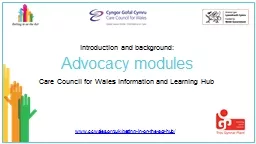PPT-Advocacy modules Care Council for Wales Information and Learning Hub
Author : tatyana-admore | Published Date : 2018-12-04
Introduction and background wwwccwalesorgukgettinginontheacthub Learning outcomes By the end of this session learners will be able to Give an overview of the Social
Presentation Embed Code
Download Presentation
Download Presentation The PPT/PDF document "Advocacy modules Care Council for Wales ..." is the property of its rightful owner. Permission is granted to download and print the materials on this website for personal, non-commercial use only, and to display it on your personal computer provided you do not modify the materials and that you retain all copyright notices contained in the materials. By downloading content from our website, you accept the terms of this agreement.
Advocacy modules Care Council for Wales Information and Learning Hub: Transcript
Download Rules Of Document
"Advocacy modules Care Council for Wales Information and Learning Hub"The content belongs to its owner. You may download and print it for personal use, without modification, and keep all copyright notices. By downloading, you agree to these terms.
Related Documents














